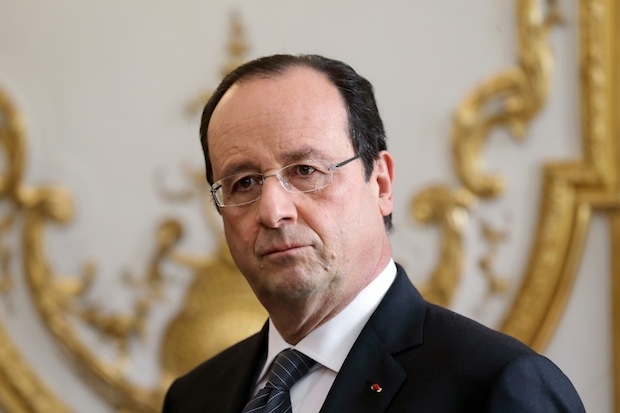Beyond the slew of amusing ‘No man’s hand’ photos of the beleaguered François Hollande trying and failing to find support from other European leaders, there are a number of implications for the British political scene of the beleaguered French leader’s latest crisis, in which he has been forced to admit that taxes have been too heavy while watching his country’s manufacturing sector fall behind that of Greece and borrowing costs rise.
The first is that David Cameron has a perfect case study of what happens when you stick your fingers in your ears and repeatedly say there is an alternative. He’s already deployed that case study this year in his op-ed for the Times earlier this week:
‘If you doubt how disastrous a return to Labour-style economics would be, just look at countries that are currently following that approach. They face increasing unemployment, industrial stagnation and enterprise in free fall. The opposite of what’s happening here. Our recovery is real, but it’s also fragile, and there are more difficult decisions ahead. A return to that economic madness would devastate this country.’
The Prime Minister is using this as a warning against voting Labour. But he can also use Hollande’s difficulties to mock Ed Miliband in a different way. Cameron and George Osborne enjoyed reminding Ed Balls at the Autumn Statement of all the incorrect economic predictions made by the Shadow Chancellor: now they can remind Labour of its incorrect allegiances. When Hollande was first elected, Miliband made a great point of saying:
‘I congratulate François Hollande on his election as President of France. I know from our conversations in London earlier this year and from his victory speech tonight of his determination to help create a Europe of growth and jobs, in a way that is responsible and sustainable. This new leadership is sorely needed as Europe seeks to escape from austerity. And it matters to Britain.
‘In his own campaign, he has shown that the centre-left can offer hope and win elections with a vision of a better, more equal and just world. I look forward to working together with him in the months and years ahead.’
The Conservatives can teasingly remind Miliband of his great enthusiasm for working with Hollande now that the president’s policies seem to be offering a little less hope. And in doing so they can weave a narrative of poor judgement at the top of the Labour party.
P.S. As for what Hollande’s continuing slide means for France, you can do no better than to read Daniel Hannan’s cover piece in this week’s Spectator on the rise of far-right parties across Europe. This makes all those awkward failed handshakes seem a little less amusing.







Comments